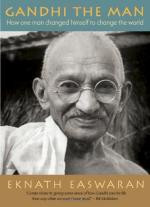
|
| Name: _________________________ | Period: ___________________ |
This quiz consists of 5 multiple choice and 5 short answer questions through Mother and Child.
Multiple Choice Questions
1. Easwaran explains that these verses describe what?
(a) The love one must feel for others.
(b) The highest state of consciousness a human can attain.
(c) The peace that can be brought to one's mind.
(d) How one should live.
2. From that moment, Easwaran's lifelong dedication to ______________ took on a new life as he strove to embody the principals of the Bhagavad Gita in the same way he had seen them made real in the person of Gandhi.
(a) His family.
(b) Peaceful living.
(c) Love.
(d) Meditation.
3. Nagler cites all of the fields in which Gandhi inspired revolution, including economics, politics, philosophy and the science and art of _________.
(a) Living quietly.
(b) Living frugally.
(c) Living a life of solitude.
(d) Living healthfully.
4. The remarkable thing about humanity, he says, is not its ability to shape our world, but ______________________.
(a) Its ability to be shaped by others.
(b) The capacity in each individual to reshape himself according to the highest ideals.
(c) Out world's ability to shape humanity.
(d) God's ability to shape humanity.
5. Gandhi coined the word ____________ to describe the Dalits (the oppressed), to call them the children of God, in order to remind the higher classes that their actions toward the oppressed was a part of their worship of God.
(a) Darijan.
(b) Madarijan.
(c) Maharijan.
(d) Harijan.
Short Answer Questions
1. Addressing the concept of ____________, Gandhi pleaded with the Indians that one cannot participate in such a system without becoming another of its victims and weakening the nation as a whole.
2. He also explained his commitment to truth and non-violence, saying that whatever the penalty for his crime, he was ready to take it, if what?
3. He was such an irresistible fund-raiser for the oppressed in India that even who gave him money for his cause?
4. Seeing that his client was clearly right, and a long court battle would benefit no one but the lawyers, what was Gandhi determined to do?
5. Britain had forbidden Indians to gather their own salt, requiring instead that they buy it at a premium from British sources. So, on Gandhi's signal, all of India would simply walk to the ocean and pick up the salt that laid there for the taking and buy and sell it locally from each other, as if the law had never been enacted. What was this called?
|
This section contains 469 words (approx. 2 pages at 300 words per page) |

|




